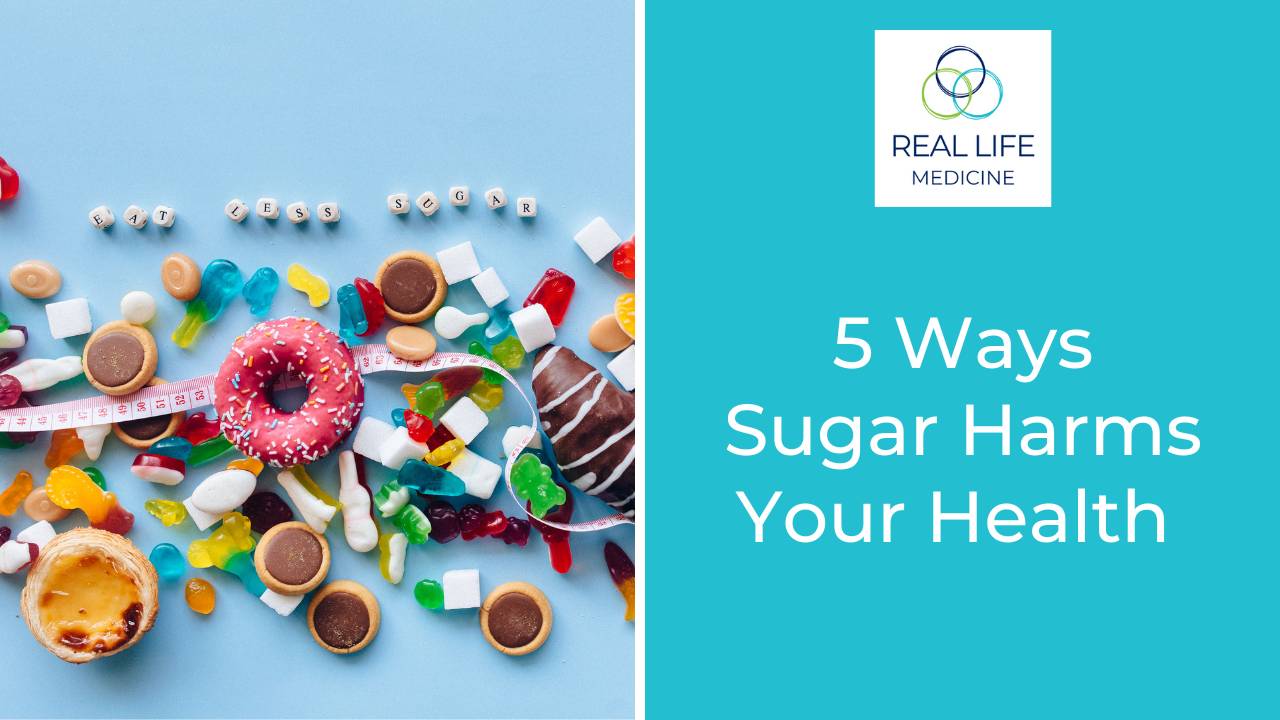
5 Ways Sugar Harms Your Health
Aug 15, 2025Ever feel like excess sugar is lurking around every corner, ready to trip us up? You’re not imagining it—between the endless soft drinks, sneaky breakfast cereals, and well-placed treats at every checkout, today’s world is set up to tempt us at every turn. We live in a truly obesogenic environment where avoiding added sugar takes real intention and a bit of know-how.
How much is too much?
Ideally we should be eating less than 25g a day of added suga. That’s about 6 teaspoons . Unfortunately, most adults currently consume much more—some estimates say we’re averaging up to 60g daily, double what’s recommended! In Australia, more than half the population regularly exceeds the suggested limit, thanks in part to sugary drinks and processed foods posing as “snacks”.
Here’s how excess sugar can undermine your health and wellbeing:
#1 Insulin Resistance (Type 2 Diabetes)
High intake of added sugars, especially from drinks and processed foods, leads to repeated spikes in blood glucose. This persistent glucose challenge causes the pancreas to release greater amounts of insulin to manage blood sugar. Over time, cells become less responsive to insulin, a state known as insulin resistance. This process is the key pathway towards the development of type 2 diabetes. Studies have shown that frequent sugar consumption impairs insulin signalling and increases fat deposition in the liver and muscle, further hampering the body's ability to control glucose levels.
#2 Fatty Liver Disease
Sugar, particularly in the form of fructose, is largely processed by the liver. When consumed in high amounts, the liver converts excess fructose into fat. This accumulation of fat can cause non-alcoholic fatty liver disease (NAFLD), a condition affecting both adults and children. NAFLD progresses from simple fat build-up to liver inflammation, scarring, and sometimes even liver failure. Scientific evidence shows that those who regularly consume sugar-sweetened beverages or have high dietary fructose are at a significantly increased risk of developing NAFLD, independent of weight status or alcohol intake.
#3 Obesity
Sugar-rich foods and beverages provide energy without significant nutritive value and do not promote satiety. This makes it easy to consume more kilojoules than the body needs, resulting in weight gain over time. Visceral fat, which accumulates around abdominal organs, is closely associated with high intake of added sugars. Excess sugar, particularly liquid forms, bypasses the body's satiety mechanisms leading to an overall higher energy intake and promoting the development of obesity and related complications such as metabolic syndrome and cardiovascular disease.
#4 Advanced Glycation End Products (AGEs)
When blood sugars are persistently high, sugars react with proteins and fats in the body to form advanced glycation end products (AGEs). AGEs accumulate in tissues over time, causing cross-linking and structural damage, particularly in blood vessels, kidneys, nerves, and skin. This process increases oxidative stress and inflammation, accelerating the development of complications in diabetes, cardiovascular disease, and contributing to the ageing process itself. High dietary sugar intake elevates circulating AGEs, further compounding the impact of hyperglycaemia on chronic disease.
#5 Tooth Decay
Dietary sugar is the primary food source for many types of oral bacteria. When these bacteria metabolise sugar, they produce acid as a by-product, which erodes tooth enamel and progressively creates cavities. Frequent sugar intake increases both the amount of substrate for bacteria and the duration teeth are exposed to acid, raising the risk of dental caries and erosion in both adults and children. Sticky sweet snacks and sugar-sweetened beverages are particularly damaging due to their prolonged contact with tooth surfaces.
References:
- https://www.healthdirect.gov.au/sugar
- https://www.heart.org/en/healthy-living/healthy-eating/eat-smart/sugar/how-much-sugar-is-too-much
- https://www.nhs.uk/live-well/eat-well/food-types/how-does-sugar-in-our-diet-affect-our-health/
- https://pmc.ncbi.nlm.nih.gov/articles/PMC9762218/
- https://pubmed.ncbi.nlm.nih.gov/29408694/
- https://pubmed.ncbi.nlm.nih.gov/38195258/
- https://pubmed.ncbi.nlm.nih.gov/35454131/
- https://pubmed.ncbi.nlm.nih.gov/32830237/
- https://hw.qld.gov.au/blog/sickly-sweet-sugar-consumption-and-our-health/
- https://pubmed.ncbi.nlm.nih.gov/19207533/
- https://pmc.ncbi.nlm.nih.gov/articles/PMC5893377/
- https://pubmed.ncbi.nlm.nih.gov/36184197/
- https://pubmed.ncbi.nlm.nih.gov/28420091/
- https://pubmed.ncbi.nlm.nih.gov/6130303/
- https://pmc.ncbi.nlm.nih.gov/articles/PMC10277187/

Dr Mary Barson and Dr Lucy are the founders of Real Life Medicine. They help women who have been on every diet under the sun, optimise their health and achieve long lasting weight loss without feeling miserable or deprived.
They do this with their 3 step framework that
- Improves metabolism
- Develops mindset skills
- Provides tools to implement it easily into busy lives
With this comes increased energy, vitality and confidence.
You can avoid chronic disease and stop living life on the sidelines!

